

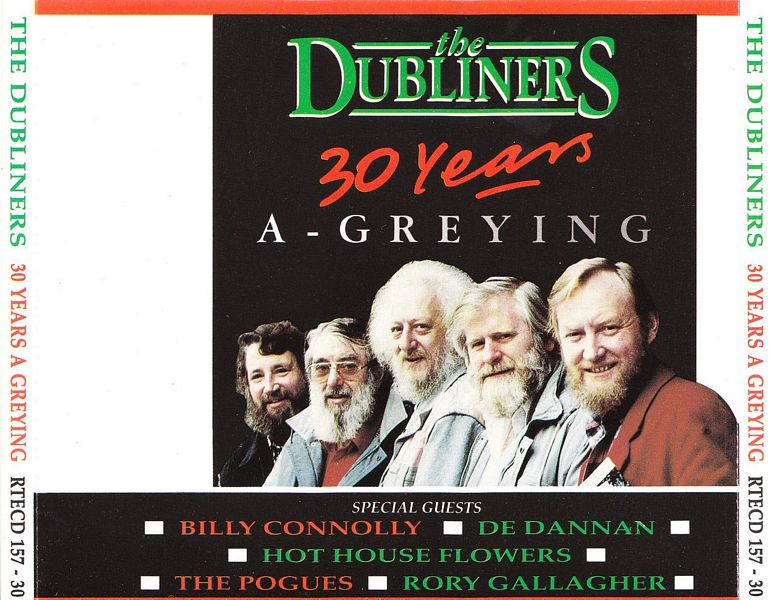 |
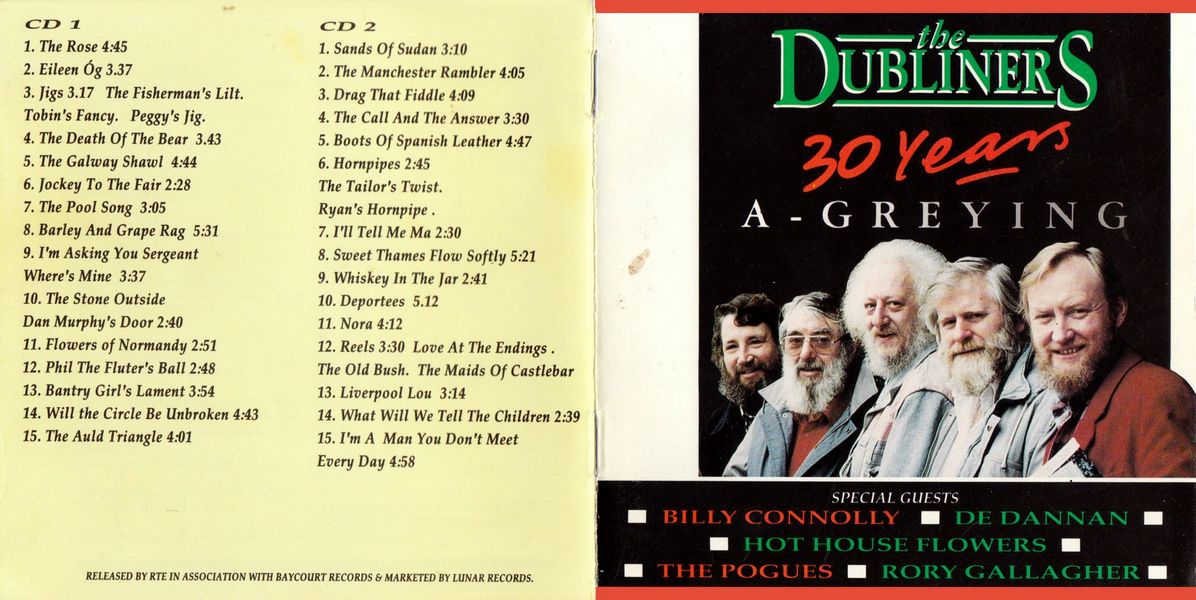
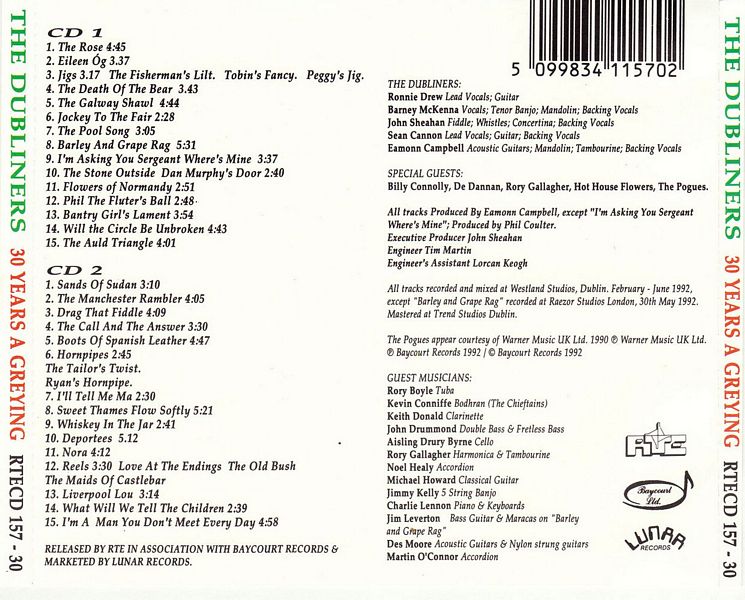
|
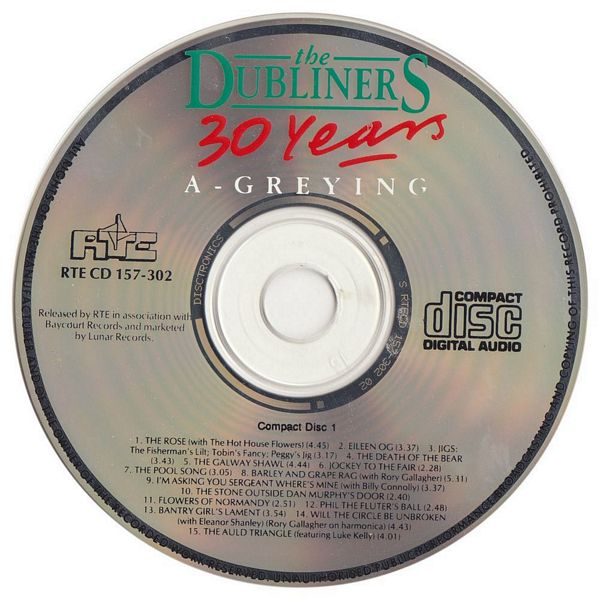
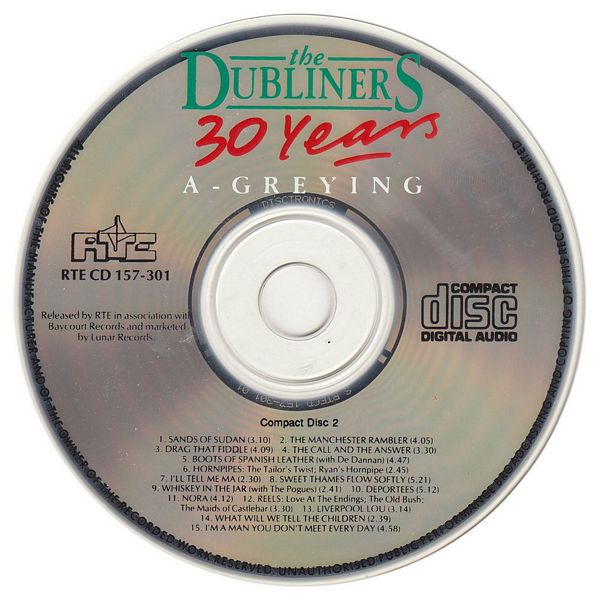 |
| more images |
Sleeve Notes
The 1960's
In 1962 there was Ronnie Drew, Ciaran Bourke, Luke Kelly and Barney McKenna out of work and sitting all day in the smoky, poky backroom of Paddy O'Donoghue's pub in Merrion Row in Dublin. With a couple of tin whistles and a banjo, they'd be singing away with the boys at the old songs; one of them would do a bit of busking occasionally to earn a quid or two -nothing serious at all, just enough to keep them in pints of Guinness. People came to hear them and they started making radio and television appearances. They were about to go before the cameras when they finally got around to calling themselves The Dubliners. By this time John Sheahan and his fiddle had joined them, and their first records were selling well in Europe. But it wasn't until Domnic Behan introduced them to Philip Solomon of Major Minor Records and Radio Caroline that they really started to make their name. 'Seven Drunken Nights' leapt up the hit parade - for decency's sake you only heard five verses. It was a track from an L.P., The New Dubliners', issued in May 1967, which sold 25,000 copies in less than three weeks, breaking all records for Folk Music. Folk had a remarkable upsurge in Britain during this period. It was a Do-it-yourself music, saying whatever writers and performers liked, and the borderline between it and 'pop' was becoming less definite. There were Traditionalists like the Dubliners who strongly identified with the past; there was music incorporating the Negro Blues; and there were groups like 'The Incredible String Band', whose music, like the Beatles' new sounds, was a mixture of Balkan, African, Middle Eastern and Scots. But The Dubliners made no concession to popularity in their music: "We couldn't change our style," said Ciaran Bourke. "Our music is traditional. Very honest, very simple - it's what we sang on the streets and we could still go back if we had to. What we do is 'abair amran' - speaking a song. We're
telling the world the stories of Ireland."
The 1970's
As they entered the new decade, it became clear that their numerous chart successes and rapidly increasing world wide popularity had changed their lives forever. Demand for their appearances were such that they would now be faced with the prospect of living two thirds of their lives out of a suitcase. Despite the obvious drawbacks this presented, at least they were doing what they were good at, getting paid for it and gaining friends as well as fans in new territories around the globe. 1972 marked their entry into the European concert circuit with hugely successful tours in Belgium, Scandinavia and Germany, and also saw them making 'stage' appearances such as their musical part in Brendan Behan's play, "Richard's Cork Leg," at the Abbey Theatre, Dublin. From September 19th of October 21st that year, they appeared in the same play but, this time, at the Royal Court Theatre, London. During the following year they made a multitude of concert appearances throughout the U.K. and maintained their growing reputation in Scandinavia, Germany and Brittany. Then in 1974 disaster struck when Ciaran Bourke suffered a massive brain hemorrhage. He was to go on to make a partial recovery but, apart from an occasional appearance with The Dubliners, he never set foot on the concert stage again. Ironically, it was at this point too, that Ronnie decided to leave in order to pursue a solo career. His replacement was Jim McCann, then recognised as being Ireland's leading solo folk artist. Yet, despite these major changes, The Dubliners played on, recording with Polydor their first album featuring Jim McCann in January 1975 and continuing to tour extensively throughout the United Kingdom and Europe including a headline billing at the Montreux Festival, In February/March 1976, they undertook their first Australian concert tour playing to capacity houses in Sydney, Adelaide, Melbourne, Perth and Canberra. Between 1977/8 they continued to record, appeared frequently on Berlin and Copenhagen television networks, made many return visits to Australia and added Iceland to their, by then extensive European itinerary. At the end of 1978, Jim McCann decided to leave the group and Ronnie returned in January, 1979. During that same year, The Dubliners did Spring and Autumn tours of Germany and a summer tour in Holland culminating in their first appearance at the hugely successful 2nd Irish Folk Festival at Eindhoven. Back home in Ireland they broke new ground with ten nights at the Olympia Theatre, Dublin, for which they received ecstatic reviews. A decade of change, no doubt, but proof enough that the greatest folk act to come out of Ireland in half a century was more than adequately equipped to enter the 80's with the same energy, talent and enthusiasm that had taken them from O'Donoghue's bar in Merrion Row to the world concert stage.
The 1980-190s
The success story of The Dubliners seems to go on and on. There they were in 1967, breaking into the elusive British charts, when it was harder to do than it is today, with their hit single, "Seven Drunken Nights." Twenty years later they made it back into the U.K. charts and onto, "Top of the Pops," with their single, "The Irish Rover," which they recorded with the London-Irish band, The Pogues. What is the secret, if any, behind their success, not only in Ireland and the U.K. but in Europe and more distant parts of the globe as well? Ronnie Drew is philosophical about it all, offering the view that he has never given it much thought, preferring to let it just happen. "I think that there could be something in the fact that nobody ever tried to change us," he says. "People let us do our own thing, let us be ourselves. That could have something to do with it." Whichever way one looks at it, their rise to fame has been remarkable by any standards, particularly as the group has undergone several changes in personnel since the original line-up. Today The Dubliners are as famous in Melbourne as they are in Manchester, as well known in Frankfurt as in Felixstowe. Certainly, none of the group could ever have imagined in his wildest dreams in 1967 that they would be back in the British charts in 1987 and competing with rock and pop stars, many of whom weren't even born when The Dubliners ruled the ballad scene. Today, the group agrees that the toughest part of the business is the travelling and few groups spend as much time circumnavigating the globe as these wandering troubadours. But they have no regrets - it's been, they say, "A good life," and continues to be so. With an attitude like that - and a continued enthusiasm for what they do - it's likely we'll all be looking forward to their 40th Anniversary in the year 2002…